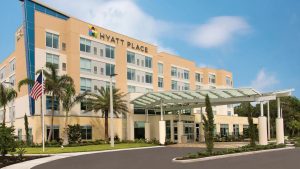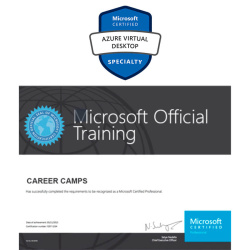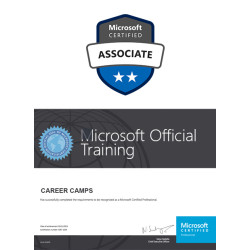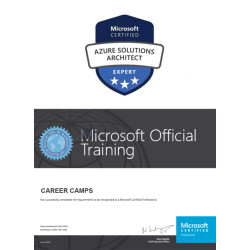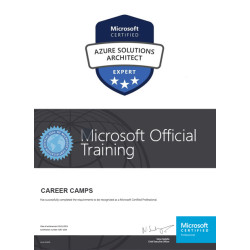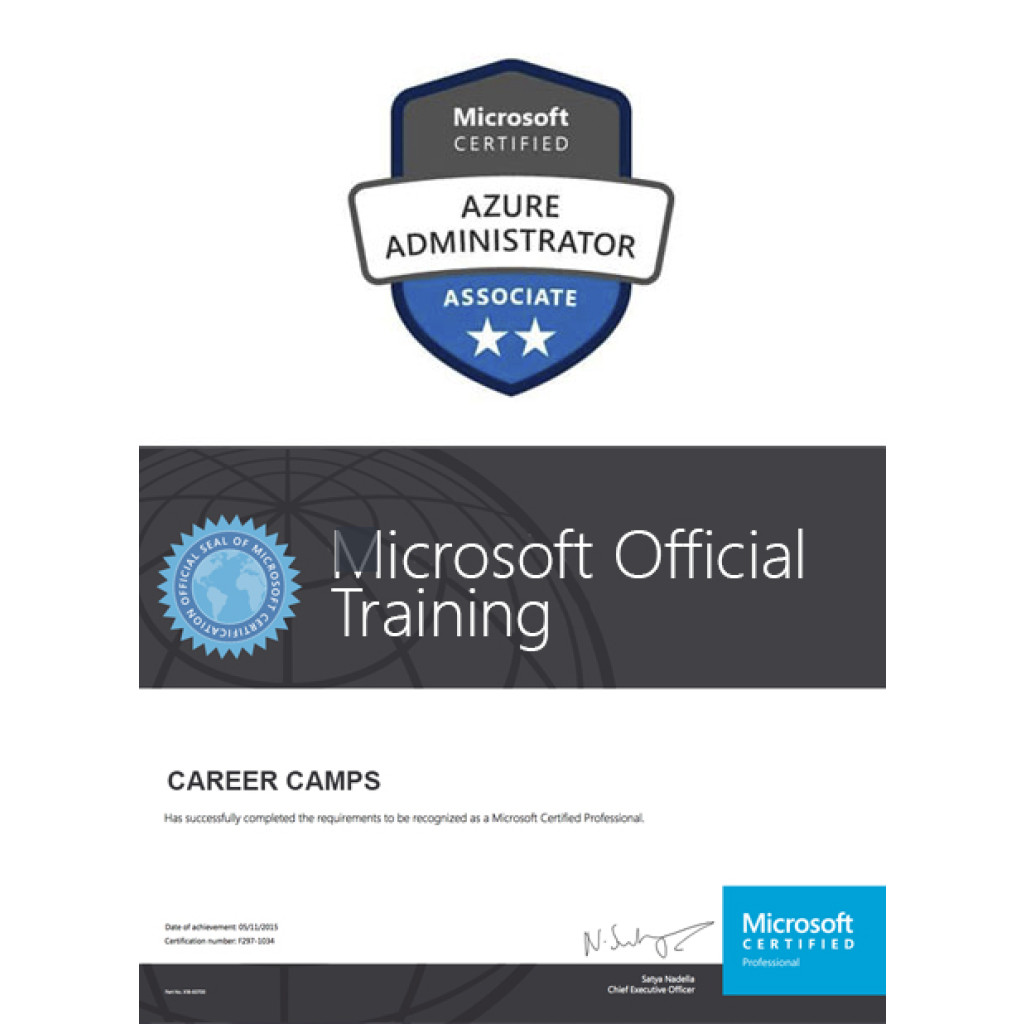
MCA Microsoft Azure Admin (w/ Azure Foundations) Certification Camp (2 Courses, 2 Exams, 2 Certs)
$4,495.00
The Azure Admin 6 Day Boot Camp covers implementing, managing, and monitoring identity, governance, storage, compute, and virtual networks in a Azure cloud environment (in addition to essential Azure Foundation topics). This camp covers TWO Microsoft courses, TWO Microsoft exams for TWO Microsoft certifications at our training facility in Florida or Online. We also offer the COMBO camp MCA Microsoft Azure Admin w/ MCE Solutions Architect COMBO Certification Camp which includes both the MCA and the MCE.
EXAMS INCLUDED
AZ-900: Microsoft Azure Fundamentals
AZ-104: Microsoft Azure Administrator
WHAT IS INCLUDED
| Airfare to/from Sarasota, FL | |
| 6 Nights of Lodging | |
| Ground Transportation | |
| Microsoft Training Books | |
| 2 Microsoft Exam Vouchers | |
| 1 Retake Voucher (per exam, if needed) | |
| Onsite Pearson Vue Test Center | |
| Microsoft Study Labs & Simulations |
LOCATIONS
Career Camps primary Microsoft Training campus (for individual students) is located in Sarasota, FL. Can’t travel to our facility? No problem! You will save on airfare, lodging and transportation. Just contact us and we will get you pricing to attend the class online live virtually from your work or home. If you do not see the location or class you are looking for, let us know! We have access to hundreds of classes and locations all across the United States and also offer corporate and group rates. If you have 5 students or more we can even come to you! With several partnerships in place, we are sure to have something to fit your needs. Whether you need to get MCA or MCE Certified, or get updated on Microsoft Windows Server 2022, we’ve got you covered.
- Description
- Additional information
- Our Facilities
- Why Choose Us
- Microsoft Azure Certifications
- Microsoft Gold Learning Partner
Description
The Microsoft Certified Azure Administrator Training & Certification 6 Day Boot Camp focuses on actual job task for implementing, monitoring and maintaining Microsoft Azure solutions including major services related to compute, storage, virtual machines, network, Azure Active Directory and security. This camp includes an essential Azure Foundations training to make sure students have an end-to-end understanding of Azure Administration.
While attending this 6 day camp – students will take two exams (AZ-900 & AZ-104) to achieve two certifications – Microsoft Certified Foundations and Associate Azure Administrator certifications. This hands on, instructor led live camp teaches the knowledge to administer an Azure environment along with the knowledge needed for the certification exams which are administered while attending. Our training and certification program maintains the highest pass rate of any Microsoft Official Training provider.
The Microsoft Certified Azure Administrator Associate boot camp is taught using Microsoft Official Courseware –
AZ-900T01: Microsoft Azure Fundamentals
AZ-104T00: Microsoft Azure Administrator
Skills Gained:
Describe cloud concepts
Describe core Azure services
Describe core solutions and management tools on Azure
Describe general security and network security features
Describe identity, governance, privacy, and compliance features
Describe Azure cost management and Service Level Agreements
Manage Azure identities and governance
Implement and manage storage
Deploy and manage Azure compute resources
Configure and manage virtual networking
Monitor and back up Azure resources
Topics Covered in this Official Boot Camp:
Use Azure Resource Manager
Identify the features and usage cases for Azure Resource Manager.
Describe each Azure Resource Manager component and its usage.
Organize your Azure resources with resource groups.
Apply Azure Resource Manager locks.
Move Azure resources between groups, subscriptions, and regions.
Remove resources and resource groups.
Apply and track resource limits.
Review Azure Resource Manager benefits
Review Azure resource terminology
Create resource groups
Create Azure Resource Manager locks
Reorganize Azure resources
Remove resources and resource groups
Determine resource limits
Introduction to Azure Cloud Shell
Experience with Azure virtual machines (VMs)
Experience with Azure virtual networks
Experience with routing and routing protocols
The ability to navigate the Azure portal and use Azure PowerShell
What is Azure Cloud Shell?
How does Azure Cloud Shell work?
When should you use Azure Cloud Shell?
Introduction to Bash
Learn what shells are and what Bash is.
Learn about the syntax of Bash commands.
Learn about important Bash commands, such as ls, cat, and ps.
Learn how to use I/O operators to redirect input and output.
Learn how to update a server’s operating system.
Learn how to find and terminate rogue processes.
Learn how to use Bash to filter Azure CLI output.
What is Bash?
Bash fundamentals
Bash commands and operators
Exercise – Try Bash
Exercise – Terminate a misbehaving process
Exercise – Use Bash and grep to filter CLI output
Introduction to PowerShell
Basic familiarity with using a command-line shell like Command Prompt or Git Bash
Visual Studio Code installed
Ability to install Visual Studio Code extensions
Ability to install software on your computer, if you’re not using a Windows operating system
What is PowerShell?
Exercise – Run your first PowerShell commands
Locate commands
Exercise – Locate commands
Configure resources with Azure Resource Manager templates
List the advantages of Azure templates.
Identify the Azure template schema components.
Specify Azure template parameters.
Locate and use Azure Quickstart Templates.
Review Azure Resource Manager template advantages
Explore the Azure Resource Manager template schema
Explore the Azure Resource Manager template parameters
Consider Bicep templates
Review QuickStart templates
Interactive lab simulation – templates
Understand Microsoft Entra ID
Describe Microsoft Entra ID.
Compare Microsoft Entra ID to Active Directory Domain Services (AD DS).
Describe how Microsoft Entra ID is used as a directory for cloud apps.
Describe Microsoft Entra ID P1 and P2.
Describe Microsoft Entra Domain Services.
Examine Microsoft Entra ID
Compare Microsoft Entra ID and Active Directory Domain Services
Examine Microsoft Entra ID as a directory service for cloud apps
Compare Microsoft Entra ID P1 and P2 plans
Examine Microsoft Entra Domain Services
Configure user and group accounts
Configure users accounts and user account properties.
Create new user accounts.
Import bulk user accounts with a template.
Configure group accounts and assignment types.
Create user accounts
Manage user accounts
Create bulk user accounts
Create group accounts
Create administrative units
Interactive lab simulation
Configure Subscriptions
Determine the correct region to locate Azure services.
Review features and use cases for Azure subscriptions.
Obtain an Azure subscription.
Understand billing and features for different Azure subscriptions.
Use Microsoft Cost Management for cost analysis.
Discover when to use Azure resource tagging.
Identify ways to reduce costs.
Identify Azure regions
Implement Azure subscriptions
Obtain an Azure subscription
Identify Azure subscription usage
Implement Microsoft Cost Management
Apply resource tagging
Apply cost savings
Configure Azure Policy
Create management groups to target policies and spending budgets
Implement Azure Policy with policy and initiative definitions
Scope Azure policies and determine compliance
Create management groups
Implement Azure policies
Create Azure policies
Create policy definitions
Create an initiative definition
Scope the initiative definition
Determine compliance
Interactive lab simulation
Configure role-based access control
Identify features and use cases for role-based access control.
List and create role definitions.
Create role assignments.
Identify differences between Azure RBAC and Microsoft Entra roles.
Manage access to subscriptions with RBAC.
Review built-in Azure RBAC roles.
Implement role-based access control
Create a role definition
Create a role assignment
Compare Azure roles to Microsoft Entra roles
Apply role-based access control
Review fundamental Azure RBAC roles
Interactive lab simulation
Create Azure users and groups in MIcrosoft Entra ID
Add users to Microsoft Entra ID.
Manage app and resource access by using Microsoft Entra groups.
Give guest users access in Microsoft Entra business to business (B2B).
What are user accounts in Microsoft Entra ID?
Exercise – Add and delete users in Microsoft Entra ID
Manage app and resource access by using Microsoft Entra groups
Exercise – Assign users to Microsoft Entra groups
Collaborate by using guest accounts and Microsoft Entra B2B
Exercise – Give guest users access in Microsoft Entra B2B
Secure your Azure resources with Azure role-based access control (Azure RBAC)
Verify access to resources for yourself and others.
Grant access to resources.
View activity logs of Azure RBAC changes.
What is Azure RBAC?
Knowledge check – What is Azure RBAC?
Exercise – List access using Azure RBAC and the Azure portal
Exercise – Grant access using Azure RBAC and the Azure portal
Exercise – View activity logs for Azure RBAC changes
Allow users to reset their password with Microsoft Entra self-service password reset
Decide whether to implement self-service password reset.
Implement self-service password reset to meet your requirements.
Configure self-service password reset to customize the experience.
What is self-service password reset in Microsoft Entra ID?
Implement Microsoft Entra self-service password reset
Exercise – Set up self-service password reset
Exercise – Customize directory branding
Configure storage accounts
Implement Azure Storage
Explore Azure Storage services
Determine storage account types
Determine replication strategies
Access storage
Secure storage endpoints
Configure Azure Blob Storage
Understand the purpose and benefits of Azure Blob Storage.
Create and configure Azure Blob Storage accounts.
Manage containers and blobs within Azure Blob Storage.
Optimize blob storage performance and scalability.
Implement lifecycle management policies to automate data movement and deletion.
Determine the best pricing plans for your Azure Blob Storage.
Implement Azure Blob Storage
Create blob containers
Assign blob access tiers
Add blob lifecycle management rules
Determine blob object replication
Upload blobs
Determine Blob Storage pricing
Interactive lab simulation
Configure Azure Storage security
Configure a shared access signature (SAS), including the uniform resource identifier (URI) and SAS parameters.
Configure Azure Storage encryption.
Implement customer-managed keys.
Recommend opportunities to improve Azure Storage security.
Review Azure Storage security strategies
Create shared access signatures
Identify URI and SAS parameters
Determine Azure Storage encryption
Create customer-managed keys
Apply Azure Storage security best practices
Interactive lab simulation
Configure Azure Flies and Azure File Sync
Identify storage for file shares versus blob data.
Configure Azure file shares and file share snapshots.
Identify features and use cases of Azure File Sync.
Identify Azure File Sync components and configuration steps.
Compare storage for file shares and blob data
Manage Azure file shares
Create file share snapshots
Implement soft delete for Azure Files
Use Azure Storage Explorer
Deploy Azure File Sync
Create an Azure Store account
Decide how many storage accounts you need for your project
Determine the appropriate settings for each storage account
Create a storage account using the Azure portal
Decide how many storage accounts you need
Choose your account settings
Choose an account creation tool
Exercise – Create a storage account using the Azure portal
Control access to Azure Storage with shared access signatures
Identify the features of a shared access signature for Azure Storage.
Identify the features of stored access policies.
Programmatically generate and use a shared access signature to access storage.
Authorization options for Azure Storage
Use shared access signatures to delegate access to Azure Storage
Exercise – Use shared access signatures to delegate access to Azure Storage
Use stored access policies to delegate access to Azure Storage
Exercise – Use stored access policies to delegate access to Azure Storage
Upload, download, and manage data with Azure Storage Explorer
Describe the features of Azure Storage Explorer.
Install Storage Explorer.
Use Storage Explorer to connect to Azure Storage services and manipulate stored data.
Connect Azure Storage Explorer to a storage account
Exercise – Connect Azure Storage Explorer to a storage account
Connect Azure Storage Explorer to Azure Data Lake Storage
Exercise – Connect Azure Storage Explorer to Azure Data Lake Storage
Configure virtual machines
Determine the responsibilities of cloud service providers and customers in a cloud computing environment.
Identify the key considerations and factors involved in planning for virtual machines. Considerations include workload requirements, resource allocation, and secure access.
Configure virtual machine storage and virtual machine sizing.
Create a virtual machine in the Azure portal.
Practice deploying an Azure virtual machine and verify the configuration.
Review cloud services responsibilities
Plan virtual machines
Determine virtual machine sizing
Determine virtual machine storage
Create virtual machines in the Azure portal
Connect to virtual machines
Interactive lab simulation
Configure virtual machine availability
Implement availability sets and availability zones.
Implement update and fault domains.
Implement Azure Virtual Machine Scale Sets.
Autoscale virtual machines
Plan for maintenance and downtime
Create availability sets
Review update domains and fault domains
Review availability zones
Compare vertical and horizontal scaling
Implement Azure Virtual Machine Scale Sets
Create Virtual Machine Scale Sets
Implement autoscale
Configure autoscale
Interactive lab simulation
Configure Azure App Service plans
Identify features and usage cases for Azure App Service.
Select an appropriate Azure App Service plan pricing tier.
Scale an Azure App Service plan.
Implement Azure App Service plans
Determine Azure App Service plan pricing
Scale up and scale out Azure App Service
Configure Azure App Service autoscale
Configure Azure App Service
Identify features and usage cases for Azure App Service.
Create an app with Azure App Service.
Configure deployment settings, specifically deployment slots.
Secure your Azure App Service app.
Configure custom domain names.
Back up and restore your Azure App Service app.
Configure Azure Application Insights.
Implement Azure App Service
Create an app with App Service
Explore continuous integration and deployment
Create deployment slots
Add deployment slots
Secure your App Service app
Create custom domain names
Back up and restore your App Service app
Use Azure Application Insights
Interactive lab simulation
Configure Azure Container Instances
Identify when to use containers versus virtual machines.
Identify the features and usage cases of Azure Container Instances.
Implement Azure container groups.
Compare containers to virtual machines
Review Azure Container Instances
Implement container groups
Review Azure Container Apps
Interactive lab simulation
Manage virtual machines with the Azure CLI
Create a virtual machine with the Azure CLI.
Resize virtual machines with the Azure CLI.
Perform basic management tasks using the Azure CLI.
Connect to a running VM with SSH and the Azure CLI.
Exercise – Create a virtual machine
Exercise – Test your new virtual machine
Exercise – Explore other VM images
Exercise – Sizing VMs properly
Exercise – Query system and runtime information about the VM
Exercise – Start and stop your VM with the Azure CL
Exercise – Install software on your VM
Create a Windows virtual machine in Azure
Create a Windows virtual machine using the Azure portal.
Connect to a running Windows virtual machine using Remote Desktop.
Install software and change the network configuration on a VM using the Azure portal.
Create a Windows virtual machine in Azure
Exercise – Create a Windows virtual machine
Use RDP to connect to Windows Azure virtual machines
Exercise – Connect to a Windows virtual machine using RDP
Configure Azure virtual machine network settings
Host a web application with Azure App Service
Use the Azure portal to create an Azure App Service web app.
Use developer tools to create the code for a starter web application.
Deploy your code to Azure App Service.
Create a web app in the Azure portal
Exercise – Create a web app in the Azure portal
Prepare the web application code
Exercise – Write code to implement a web application
Deploy code to App Service
Exercise – Deploy your code to App Service
Configure virtual networks
Describe Azure virtual network features and components.
Identify features and usage cases for subnets and subnetting.
Identify usage cases for private and public IP addresses.
Create a virtual network and assign IP address.
Plan virtual networks
Create subnets
Create virtual networks
Plan IP addressing
Create public IP addressing
Associate public IP addresses
Allocate or assign private IP addresses
Interactive lab simulation
Configure network security groups
Determine when to use network security groups.
Create network security groups.
Implement and evaluate network security group rules.
Describe the function of application security groups.
Implement network security groups
Determine network security group rules
Determine network security group effective rules
Create network security group rules
Implement application security groups
Interactive lab simulation
Configure Azure Virtual Network peering
Identify usage cases and product features of Azure Virtual Network peering.
Configure your network to implement Azure VPN Gateway for transit connectivity.
Extend peering by using a hub and spoke network with user-defined routes and service chaining.
Determine Azure Virtual Network peering uses
Determine gateway transit and connectivity
Create virtual network peering
Extend peering with user-defined routes and service chaining
Interactive lab simulation
Configure network routing and endpoints
Implement system routes and user-defined routes.
Configure a custom route.
Implement service endpoints.
Identify features and usage cases for Azure Private Link and endpoint services.
Review system routes
Identify user-defined routes
Determine service endpoint uses
Determine service endpoint services
Identify private link uses
Interactive lab simulation
Configure Azure Load Balancer
Identify features and usage cases for Azure Load Balancer.
Implement public and internal Azure load balancers.
Compare features of load balancer SKUs and configuration differences.
Configure back-end pools, load-balancing rules, session persistence, and health probes
Determine Azure Load Balancer uses
Implement a public load balancer
Implement an internal load balancer
Determine load balancer SKUs
Create back-end pools
Create health probes
Create load balancer rules
Configure Azure Application Gateway
Identify features and usage cases for Azure Application Gateway.
Implement an Azure application gateway, including selecting a routing method.
Configure gateway components, such as listeners, health probes, and routing rules.
Implement Azure Application Gateway
Determine Azure Application Gateway routing
Configure Azure Application Gateway components
Design an IP adressing schema for your Azure deployment
Identify the private IP addressing capabilities of Azure virtual networks.
Identify the public IP addressing capabilities of Azure.
Identify the requirements for IP addressing when integrating with on-premises networks.
Network IP addressing and integration
Public and private IP addressing in Azure
Plan IP addressing for your networks
Exercise – Design and implement IP addressing for Azure virtual networks
Distribute your services across Azure virtual networks and integrate them by using virtual network peering
Identify use cases for virtual network peering.
Identify the features and limitations of virtual network peering.
Configure peering connections between virtual networks.
Connect services by using virtual network peering
Exercise – Prepare virtual networks for peering by using Azure CLI commands
Exercise – Configure virtual network peering connections by using Azure CLI commands
Exercise – Verify virtual network peering by using SSH between Azure virtual machines
Host your domain on Azure DNS
What is Azure DNS?
Configure Azure DNS to host your domain
Exercise – Create a DNS zone and an A record by using Azure DNS
Dynamically resolve resource name by using alias record
Exercise – Create alias records for Azure DNS
Manage and control traffic flow in your Azure deployment with routes
Identify the routing capabilities of an Azure virtual network
Configure routing within a virtual network
Deploy a basic network virtual appliance
Configure routing to send traffic through a network virtual appliance
Identify routing capabilities of an Azure virtual network
Exercise – Create custom routes
What is an NVA?
Exercise – Create an NVA and virtual machines
Exercise – Route traffic through the NVA
Improve application scalability and resiliency by using Azure Load Balancer
Identify the features and capabilities of Azure Load Balancer.
Deploy and configure an Azure Load Balancer.
Azure Load Balancer features and capabilities
Configure a public load balancer
Exercise – Configure a public load balancer
Internal load balancer
Introduction to Azure Backup
Basic knowledge of navigating the Azure portal
Basic knowledge of file and folder backup concepts
Basic knowledge of Azure Files shares, Azure VMs, and Azure Managed Disks
Basic knowledge of on-premises backup scenarios
What is Azure Backup?
How Azure Backup works
When to use Azure Backup
Configure virtual machine backups
Identify features and usage cases for different Azure backup methods.
Configure virtual machine snapshots and backup options.
Implement virtual machine backup and restore, including soft delete.
Perform site-to-site recovery by using Azure Site Recovery.
Explore options to protect virtual machine data
Create virtual machine snapshots in Azure Backup
Set up Azure Recovery Services vault backup options
Back up your virtual machines
Restore your virtual machines
Implement soft delete for your virtual machines
Implement Azure Site Recovery
Interactive lab simulation
Configure Azure Monitor
Identify the features and usage cases for Azure Monitor.
Configure and interpret metrics and logs.
Identify the Azure Monitor components and data types.
Configure the Azure Monitor activity log.
Describe Azure Monitor key capabilities
Describe Azure Monitor components
Define metrics and logs
Identify monitoring data and tiers
Describe activity log events
Query the activity log
Interactive lab simulation
Configure Log Analytics
Identify the features and usage cases for Log Analytics.
Create a Log Analytics workspace.
Structure a Log Analytics query and review results.
Determine Log Analytics uses
Create a Log Analytics workspace
Create Kusto (KQL) queries
Structure Log Analytics queries
Configure Network Watcher
Identify the features and usage cases for Azure Network Watcher.
Configure diagnostic capabilities like IP Flow Verify, Next Hop, and Network Topology.
Describe Azure Network Watcher features
Review IP flow verify diagnostics
Review next hop diagnostics
Visualize the network topology
Improve incident response with Azure Monitor alerts
Configure alerts on events in your Azure resources based on metrics, log events, and activity log events.
Learn how to use action groups in response to an alert, and how to use alert processing rules to override action groups when necessary.
Explore the different alert types that Azure Monitor supports
Use metric alerts for alerts about performance issues in your Azure environment
Exercise – Use metric alerts to alert on performance issues in your Azure environment
Use log alerts to alert on events in your application
Use activity log alerts to alert on events within your Azure infrastructure
Use action groups and alert processing rules to send notifications when an alert is fired
Exercise -Use an activity log alert and an action group to notify users about events in your Azure infrastructure
Analyze your Azure infrastructure by using Azure Monitor logs
Identify the features and capabilities of Azure Monitor logs.
Create basic Azure Monitor log queries to extract information from log data.
Features of Azure Monitor logs
Create basic Azure Monitor log queries to extract information from log data
Exercise – Create basic Azure Monitor log queries to extract information from log data
Monitor your Azure virtual machines with Azure Monitor
Understand which monitoring data you need to collect from your VM.
Enable and view recommended alerts and diagnostics.
Use Azure Monitor to collect and analyze VM host metrics data.
Use Azure Monitor Agent to collect VM client performance metrics and event logs.
Additional information
| Class Dates | 07/07/2025 – 07/12/2025 – Sarasota, FL, 08/04/2025 – 08/09/2025 – Sarasota, FL, 09/08/2025 – 09/13/2025 – Sarasota, FL, 10/06/2025 – 10/11/2025 – Sarasota, FL, 11/03/2025 – 11/08/2025 – Sarasota, FL |
|---|
Our Facilities
CAREER CAMPS FACILITIES
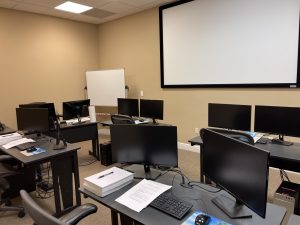
CLASSROOM EQUIPMENT – Students work on a dedicated Dell Client Desktop with 32GB memory with 512GB SSD drives – All Labs are executed the extremely fast Microsoft Data Center Hosted Lab Environment.
CAMPUS INTERNET – The campus is connected with a 1Gbps (1,000 Mbps) Verizon Fios Business Connection which provides complete internet (including VPN) access for students.
COMMON AREA – Amenities including snacks, drinks (Coffee, 100% juices, sodas, etc) all complimentary.
LODGING – We use the Hyatt Place Lakewood Ranch. This “upgraded” hotel offers extremely comfortable beds, great breakfast and very fast internet access.
NEAR BY AMENITIES – Many shops, restaurants and grocery options are available within walking distance. Additionally – the hotel provided scheduled shuttle services. Restaurants like Bone Fish Grill, Ruby Tuesday’s, Five Guys, Chipotle, Quiznos, Chili’s and over 20 additional choices in the immediate area. All of these options are offered in a pedestrian walking village.
Why Choose Us
CAREER CAMPS DIFFERENCE
Career Camps provides an in-depth hands on learning environment. Our instructors teach using demonstrations and explain concepts beyond the scope of the courseware. The best instructors are contracted from all across the US. These professionals are real world consultants who actually implement these technologies. Career Camps knows our clients work in the “real world” and it only makes sense to have an instructor with the experience in the real world.
Facilities – Many of our competitors over-crowd classrooms by placing 2 to 3 students per desk and 20+ students per instructor. Often these companies “extend” the life of very old equipment with slow performance on the software used today. Our average class size is 8 students. Our facilities have the best equipment with the most comfortable, focused environment for learning.
Instructors – Our CEO, Chester Flake holds one of the rarest Microsoft Certifications – the Microsoft Certified Learning Consultant (MCLC) Certification. This certification reflects a commitment to make sure our instructors are also actively engaged in real world consulting projects. Students expect a professional who can answer questions and demonstrate the technology.
Face to Face Training – We believe the best way to interact and learn is face to face training. Many of our competitors which offer local training are simply providing students with headphones/mic to attend class with an instructor at a remote location.
Test Pass – We offer a free retake voucher (if needed) for each of the exams required for certification. Any training center offering a “100% pass guarantee” would have to use unethical practices or unlimited test vouchers (which is not likely or practical).
Distractions – Students often look for a “local” training center so they can be close to home and work. Boot camp requires a tremendous time commitment during the program. Long class hours combined with self study each evening. The goal of boot camp is to achieve certification in a fraction of the time. We strongly recommend students attend camp away from home and work in a focused, distraction free environment.
Boot Camp – Boot camp is an accelerated training focused on teaching technology and testing students on the official exams. Most training providers “added” boot camps to the existing standard training classes they offer. These training centers think a boot camp is just a regular class where you send the student home with a voucher on the last day. Career Camps administers exams throughout the camp. Equally important – not every trainer can teach a boot camp and not all courseware is designed for boot camp format. Our trainers know the boot camp format and our courseware is designed for accelerated learning.
Florida – Career Camps has one of the most scenic locations boasting some of the best weather in US. We believe students should have a comfortable and inviting atmosphere while attending these otherwise intense programs. We place our location, facilities and amenities up against that any competitor.
Microsoft Azure Certifications
Microsoft Job Role-based Azure Certifications
Microsoft has aligned Azure certifications and training to job roles – focusing on Admin, Dev or Architect.
Each certification requires 2 exams and no certification has any prerequisite certification requirements.
Microsoft Gold Learning Partner
Career Camps has developed a comprehensive training / delivery format which focuses on learning beyond the core content accessible to any Microsoft training provider. Our program incorporates interactive demonstrations with explanations which go beyond the content of the book. Additional content, videos, labs & demonstrations are provided to expand on advanced topics – providing additional insight and perspective.
Career Camps training is not the typical book & PowerPoint presentation found at any local training center.
As a Microsoft Certified Partner with Gold Learning Competency – we adhere to the strict guidelines, standards and requirements to use Microsoft’s exclusive curriculum. More over – our standards go beyond the “minimum requirements” set forth by Microsoft Learning.
We leverage our partnership benefits of courseware customization to build end to end technology training solutions. Students gain practical skills which can be implemented immediately.
At most training centers – learning starts on the first day of class and ends on the last day. Our boot camp training program is designed to offer resources before, during and after.
You May Also Like:
Related products
-
MCS Microsoft Azure Virtual Desktop Specialty Certification Camp (1 Course, 1 Exam, 1 Cert)
$2,995.00 Select options This product has multiple variants. The options may be chosen on the product page -
MCA Microsoft Azure Security Engineer Certification Camp (1 Course, 1 Exam, 1 Cert)
$2,995.00 Select options This product has multiple variants. The options may be chosen on the product page -
MCA Microsoft Azure Admin (w/ Foundations) + MCE Solutions Architect COMBO Certification Camp (3 Courses, 3 Exams, 3 Certifications)
$5,995.00 Select options This product has multiple variants. The options may be chosen on the product page -
MCE Microsoft Azure Solutions Architect Certification Camp (1 Course, 1 Exam, 1 Cert)
$2,995.00 Select options This product has multiple variants. The options may be chosen on the product page
